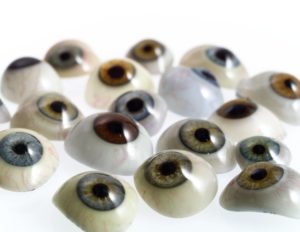Dealing with the loss of an eye can make patients feel conspicuous and awkward. Darrell Hardin has just the prescription – compassion, humor and beautiful artificial eyes.
Hardin is an ocularist in Willoughby, Ohio. He combines technical skill with a sense of artistry to make eyes for patients who have lost them due to disease or injury. He offers hope for a sense of normalcy for his patients by creating realistic artificial eyes. But he does much more for those who walk into his office, as a recent story in the Cleveland Plain Dealer describes
“Hardin’s irreverent, sometimes corny, sense of humor serves to put patients at ease, and to let them know that it is OK, healing, even, to laugh at the circumstances that caused them to seek his services.”
As the saying goes, sometimes laughter is the best medicine.
Losing an eye is traumatic. Patients can experience a profound sense of loss, depression and self-consciousness about how they look. Hardin’s demeanor helps lift the gloom.
He has a particular empathy for cancer patients. He battled the disease himself.
“Hodgkins in the ’70’s,” he told the Plain Dealer. “I know . . . I thought, ‘Oh, I’m gonna die.’ But my 87-year-old aunt says ‘God doesn’t want a weed in his garden, and the Devil doesn’t want competition.’”
Hardin can also intimately empathize with patients who have lost an eye. His wife Cindy was born with glaucoma and had an eye removed in her 30s.
“If my wife had both eyes, she probably wouldn’t be with me.” He laughs and then turns more serious. “I finally found a person who understands what I do, and why.”
Hardin calls his work his passion. He paints each eye by hand, creating a prosthetic that is hardly noticeable to the average passerby. It is now possible to produce artificial eyes digitally, but Hardin says they don’t have the depth of hand-painted prosthetics.
“It’s not an ego trip. I try to do my best. My goal is for you not to notice my work.”
Hardin’s work underscores two important points.
First, even if you lose an eye, it’s possible to live a normal life. Most patients can see with their remaining eye and will most likely be able to do all the things they used to do before, even drive a car. With modern eye prosthesis, the loss of the eye is hardly noticeable, as you can see in our enucleation after-image gallery.
Second, a human touch is vital when interacting with people facing adversity such as the loss of an eye, or a diagnosis of eye cancer. At the New York Eye Center, we call this “patient-centered care,” and it’s the foundation of everything we do.
Photo Credit: Wellcome Library, London. Used under creative common license











I was diagnosed with a OM in 2010 long story but am so thrilled to say that I have my 3rd prothesis,which has taken two years to settle.I am so thrilled with it I live in South Africa,my prothesis was made by a fantastic Technician by the name of Gavin Downward.I am forever grateful.